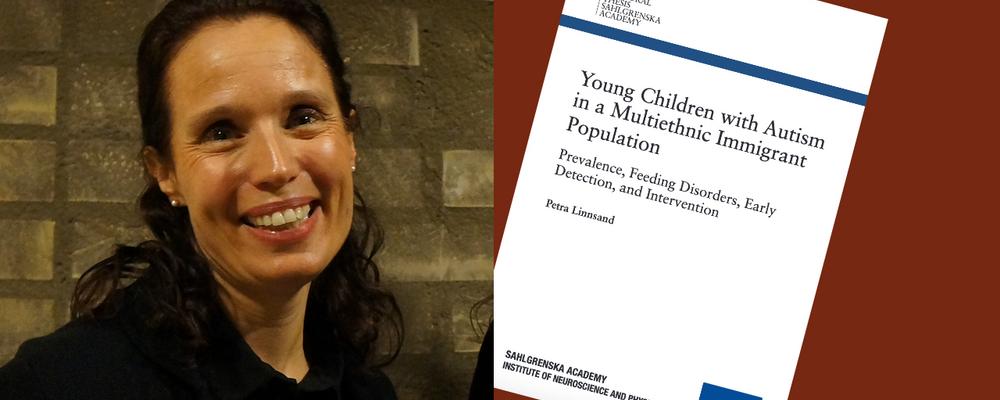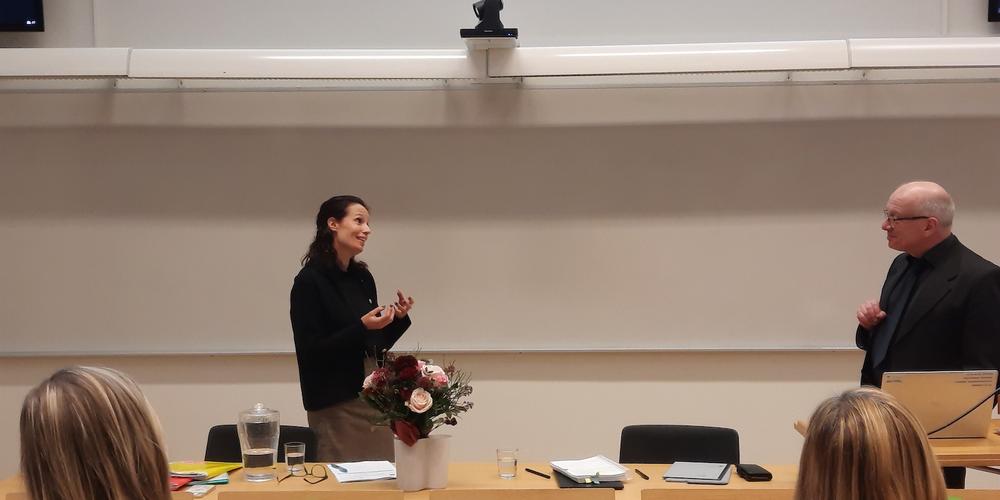
- Home
- News and events
- Find news
- Petra Linnsand successfully defends her thesis
Petra Linnsand successfully defends her thesis
GNCs Petra Linnsands successfully defends her thesis on "Young Children with Autism in a Multiethnic Immigrant Population. Prevalence, Feeding Disorders, Early Detection, and Intervention".

The GNC is thrilled to announce that Petra Linnsand successfully defended her thesis 8th December 2023. A short summary of her thesis entitled "Young Children with Autism in a Multiethnic Immigrant Population. Prevalence, Feeding Disorders, Early Detection, and Intervention" can be found below.
Background:
Autism is a neurodevelopmental condition characterized by a pattern of major impairments in social communication and behavioural/sensory problems, with high rates of coexisting neurodevelopmental and medical conditions. Children born to immigrant parents may face an increased risk of autism. Several studies tend to suggest that they are often diagnosed with autism relativity late, potentially depriving them of important early interventions.
Aims:
The thesis had four primary objectives
(1) examine autism prevalence and risk factors,
(2) describe clinical characteristics of autism, including feeding problems,
(3) explore psychometric properties of the instrument Joint Attention Observation Schedule Preschool (JA-OBS preschool) in children with suspected autism
(4) describe an intervention program based on the Early Start Denver Model (ESDM) for young children with autism in a preschool setting and capture the experiences of the preschool staff involved in the implementation of this program.
Methods:
Data were collected from a prospective longitudinal study of 46 preschool-aged children diagnosed with DSM-5 autism spectrum disorder living in a multiethnic immigrant population area. Medical records from the Child Health Centre and comprehensive neuropsychiatric assessments were used. Data encompassed the period from pre- and perinatal stages up to the child’s sixth year of age. Semi-structured interviews were conducted with 15 preschool staff members in the fourth study.
Results:
The registered prevalence for autism in the area was 3.7%. A range of risk factors, including both genetic and non-genetic factors, were identified. A significant proportion of the children with autism experienced feeding problems (76.1%), with Avoidant/Restrictive Food Intake Disorder (ARFID) noted in 28.3% of cases. Early onset age and heterogeneity of feeding problems were highlighted. The internal consistency reliability of the JA-OBS Preschool was estimated at 0.8 (Cronbach’s alpha) and percent agreement across raters ranged from 76.9% to 100%. Central components of the intervention program, grounded in the ESDM framework, were emphasised by the preschool staff. These encompassed contextual prerequisites, such as the preschool staff’s participation in intervention program fostered by the local environment and features linked to the ESDM methodology. The preschool staff’s experiences indicated that the implementation of ESDM enriched the learning experiences of children with autism, their parents, fellow peers within the preschool, as well as the staff members themselves.
Conclusions:
A high prevalence of autism among children within this immigrant population was found. Multiple associated factors for autism were documented, along with substantial individual needs of both the children and their families. This encompassed very high rates of early feeding problems and ARFID. The results underscore the imperative to develop multidisciplinary models in healthcare that increase accessibility to services for children with autism in immigrant communities. Preschools may hold significant potential for the early identification of autism indicators. The intervention program based on the ESDM presents a promising model for young children with autism in the multiethnic immigrant setting.
Keywords:
autism, young children, immigrant population, prevalence, feeding disorders, ARFID, early detection, early intervention, Early Start Denver Mode
Opponent and examining committee
Opponent: Professor Ulf Axberg, Faculty of Social Work, VID Specialized University, Oslo, Norway
Examining committee: Professor Jovanna Dahlgren (chair), Professor Anna Sarkadi (UU) and Professor Therése Skoog




